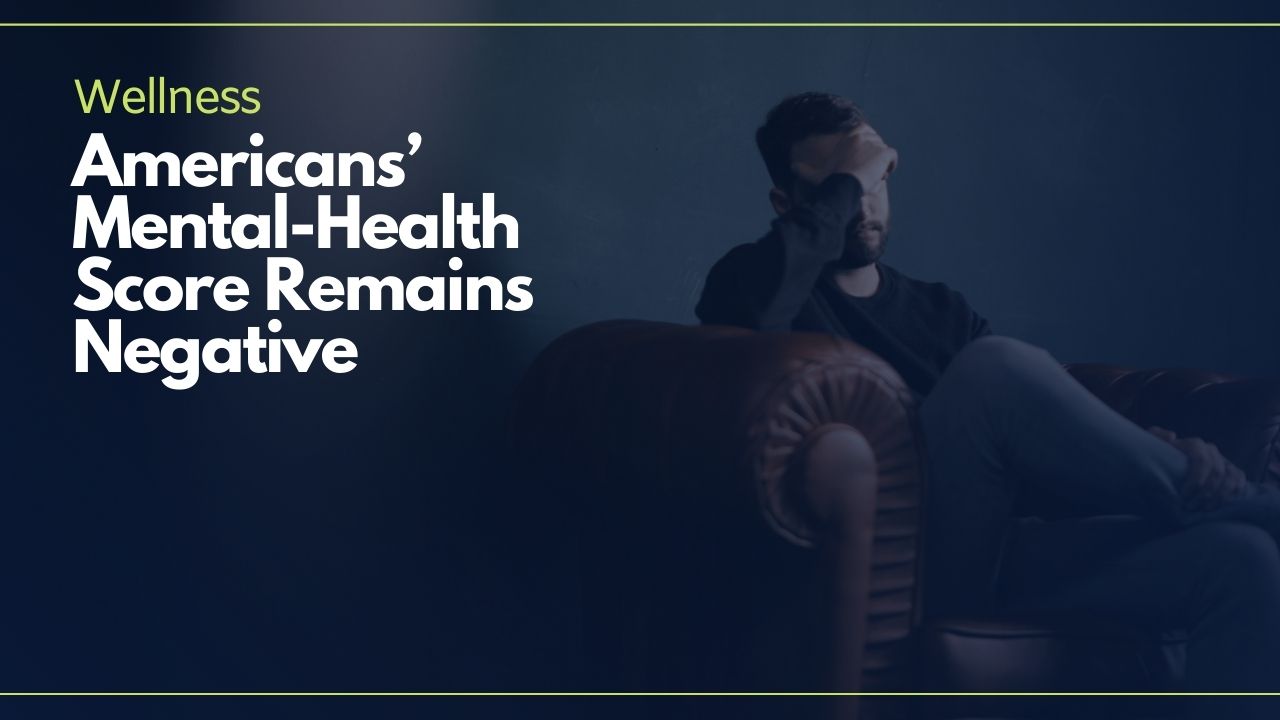- A report by LifeWorks revealed a negative mental health score for Americans for the thirteenth consecutive month.
- While the findings aren’t exactly positive, the good news is that the optimism scores have shown general improvement since last year.
- Improvements are linked to anticipation of herd immunity, vaccines, an end to lockdown, and better business, which is leading to increased optimism.
LifeWorks Inc. recently published the findings of its April Mental Health Index report, which revealed a negative mental health score for Americans for the thirteenth consecutive month. The score for April 2021 was –5.5, and the negative score indicates lower levels of mental health compared to the pre-pandemic benchmark.
While the findings aren’t exactly positive, the good news is that the April 2021 score is one full point higher than it was in March 2021; the report also found that optimism scores since April 2020 have shown general improvement (more on this later).
Key Findings from the Report
- 47% of Americans feel the need for mental health support.
- Of those who have not acted on mental health despite the need:
- 28% believe that affordable care is not available.
- 27% report that they do not have time to seek care.
- 21% report that they do not have energy to seek care.
- 14% report discomfort sharing as a barrier to care.
- 68% use exercise to improve their mental health, followed by healthy eating (51%), and changing the way of thinking about things (39%).
Who’s Suffering the Most?
According to the report, unemployed people have the lowest mental health score (-15.5); they are closely followed by those who report fewer working hours compared to the previous month, and those who have experienced salary cuts.
Interestingly, the report found that managers have lower mental health scores than non-managers.
While the report doesn’t address why, previous surveys have found that managers — specifically middle managers — are more stressed than ever. Future Forum’s survey of the company’s 9,000 workers found that middle managers were 91% more likely to say they were struggling with remote work. It has, after all, fallen on them to take pay-cuts, lay off employees, and deliver bad news to staff.
At a company level, the report found that those that work for large corporations, more than 10,000 employees, experience the highest mental health score, while those who work for companies with 51-100 employees experience the lowest mental health score. This data may hint at the fact that employees at larger companies may have access to more perks and benefits that allow them to take care of their mental health.
The Barriers Preventing People from Seeking Care
The report found that 12% of people have not taken steps to improve their mental health, but that they would like to.
So, why haven’t they? Even after a year of significant accumulation of mental stress strain?
The main barrier to seek out care is affordability. This is followed by having no time to seek care, no energy to seek care, and uncertainty about the proper care for their needs. In some instances, many employees are not fully aware of the care options available to them—employer-sponsored or otherwise.
Strategies that Are Helping Workers Cope
The good news is that many people report effective coping mechanisms, even if they are not seeking out care.
The survey found that workers are turning to exercise and healthy eating to improve their mental health. Other coping strategies identified by the report include:
- Changing the way they think about things
- Talking to a religious leader
- Talking to family members
- Talking to friends
- Talking to colleagues and managers.
Is There Light at the End of the Tunnel?
Yes.
The optimism score in April 2021 (-5.4) is the highest since the introduction of the scale, at more than 14-points higher than in April 2020 (-8.9), the report found.
So, what’s contributing to the positive outlook?
For starters, anticipation of herd immunity and vaccines. The report found that 26% of Americans reported that their outlook would be helped by the population reaching herd immunity, followed by 24% of employees’ outlook influenced by getting vaccinated against COVID-19.
Herd immunity and vaccines means that restrictions and lockdowns will be lifted, something that many are looking forward to. This, in turn, will help improve business, and many expect that their hours and salaries will increase once businesses reopen.

















